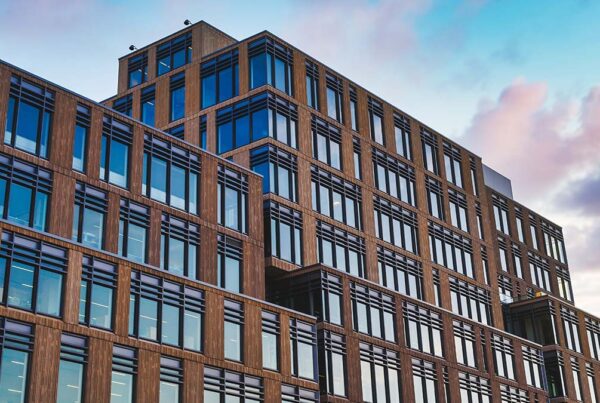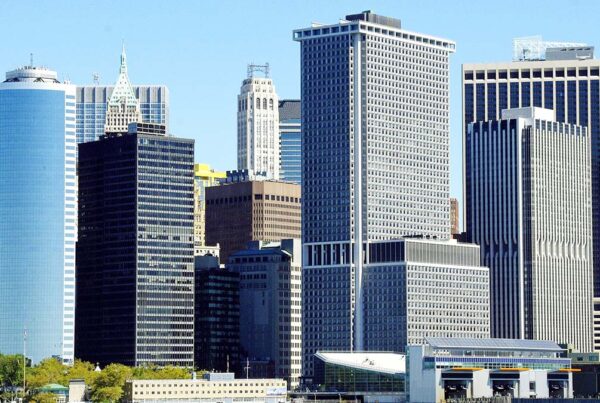
When you start evaluating deals, one of the most common questions is, “What makes a commercial property a good investment?”
This is an excellent question because it reveals ten factors that you should consider (at minimum) to determine whether or not a commercial property is a good investment.
Like all things in commercial real estate investing, “good” is subjective to you, your situation, and your goals. Remember that what might be a good deal for one person may not be a good deal for another. With that, here’s an overview of the ten factors you should consider to determine if a commercial property is a good investment:
1) Location
You’ve heard the phrase that when it comes to real estate, it’s all about “location, location, location!”
While this phrase is cliché, it holds a lot of truth; you can change many things about a property in terms of the structure, quality, and decor. You can even tear down the building and rebuild something new! The location, on the other hand, can never be changed.
Because of this, it’s paramount that the location of any commercial real estate property you purchase is in an area that suits the type of property well. For example, if you’re buying a multifamily building, it should be in an area with jobs, access to grocery stores, restaurants, bars, etc. If you’re purchasing an industrial building, it should have easy access to the highway and not require complex turns that large trucks need to navigate. If the property is not in a good location for its asset class, it’s likely not a good investment.
2) Overall Value
Commercial real estate investing is a numbers game. When you evaluate a property, you should analyze key numbers such as the Return on Equity and Cash on Cash Return to name a few. You should also have a strong understanding of how you will increase the property’s value, how much it will cost to increase the value of the property, how the improved property will translate to increased rent, and how much you anticipate you’ll earn when you sell the property.
This type of road map will help show you what type of value is waiting to be unlocked in the deal. If there isn’t a good amount of value to unlock, it’s probably not a good deal.
3) Yield
The average rate of return for various asset types varies. Some of the highest-yielding commercial real estate properties include mobile home parks, self-storage facilities, billboards, and RV parks. Historically, these asset types haven’t been the hottest properties around, but many of these properties can trade at a cap rate of 10% or higher.
Apartments, retail, industrial, and office properties may have a slightly lower cap rate. In contrast, raw land generates no income and thus has a 0% cap rate (or even negative when you include insurance and property tax).
For a real estate property to be a good investment, you must be clear on what you need/want to get out of the property in terms of yield and benchmark with similar properties in the area. If the yield isn’t good compared to similar properties in the area, it might not be a good deal.
4) Growth Potential
This factor comes in a couple of different forms.
First, does the surrounding area/neighborhood of the property you’re analyzing—regardless of asset class—have the likelihood of growing? If not, that should be a serious red flag, and you should further explore why you would invest in the area to begin with.
Second, does the type of property itself have the potential for growth in demand? For example, if you are evaluating a self-storage property, do you see the demand for self-storage units growing over the next decade? If so, you’ll be in a great position. If not, you may find yourself slashing your own prices to break even.
Good commercial real estate properties have strong growth potential in both of these areas.
5) Market Stability
Aside from growth potential, you also want to consider market stability.
How stable is the city itself? How stable is the region? To evaluate the market’s stability, look at economic, environmental, regulatory, and political trends? Are they stable? Are there any threats that may disrupt the region and make it harder to conduct business, perform your job, etc.?
If there are any indicators that the city or region is unstable—or on the verge of becoming unstable—you’re likely entering a riskier investment because all of those factors have a large impact on the success of your property.
6) Diversification of Tenants
Just like it’s a good idea to diversify your portfolio with different types or locations of properties, it’s also a good idea to acquire properties that bring in a number of different tenants.
For example, if you acquire a five-unit multifamily property, achieve 100% occupancy, and two people decide not to renew their lease, you’re suddenly at 60% occupancy. If you acquire a 100-unit multifamily property, achieve 100% occupancy, and 10 tenants decide not to renew their lease, you’re still at 90% occupancy. The more tenants you have in multifamily, and the more diversity represented amongst the industries of their jobs, the more resilient the property is going to be to weather economic recessions. This also applies to properties such as mobile home parks, RV parks, self-storage facilities, and office buildings.
Suppose you purchase a property that can only serve one tenant such as an industrial building. In that case, you want to do everything legally allowed to ensure the tenant you place in the property is a strong business that works in an in-demand industry. As an example, purchasing a coal preparation facility in the U.S. may not be the best choice right now since the use of coal has been on a steady decline in the country since 2008. If you acquire a coal preparation facility today and place a coal preparation company in the property on a 20-year lease, the market trends suggest you may be in for a rocky road ahead.
7) Reduced Down Payment Requirements
One of the strongest advantages that comes with commercial real estate investing compared to other types of investing is the amount of leverage you can gain on your money by using other people’s money. Many banks require 20% to 30% of the purchase price for a down payment to acquire a property, which is great in the grand scheme of things.
However, it’s also possible to work out seller financing deals or other financing terms that minimize the amount of money you need to front out-of-pocket to acquire a property. The less you can pay out of pocket on a down payment, the more leverage you have. The more leverage you have, the more potential you may gain. For example, if you’re able to work out a seller financing deal with zero dollars out of pocket, your returns are infinite.
It’s important to understand that taking on more leverage can be riskier and isn’t always a good idea just for the sake of having a lower down payment or reduced out-of-pocket costs. Therefore, you shouldn’t do this just for the sake of doing it. Conduct your due diligence and establish what makes sense for your specific situation, your goals, your risk tolerance, and the property itself.
8) Exit Opportunities
Purchasing a property is only one side of the equation—you also have to be able to successfully sell the property when you want or need to sell the property.
The acquisition and renovation processes often receive the bulk of the attention. However, if you aren’t able to exit the property the way you hoped, the entire deal could backfire on you. Therefore, it’s extremely important that as you conduct your due diligence for acquiring a property, you’re also doing your due diligence for thinking about how you’ll realistically sell the property. Suppose you find a cheap property, improve the units, rent them out, and try to sell but don’t have any buyers who want to purchase in that particular area because the population of the town is declining. In that case, you’ll be stuck with the property, and it could start taking money out of your pocket rather than putting money into your pocket.
9) Timeline Flexibility
In addition to having exit opportunities, another factor that makes a good commercial real estate investment is flexibility in timeline. The property partly determines this, but the financing terms more heavily influence it.
Think about how long you ideally want to hold the property and then how long you may need to hold the property in a worst-case scenario. For example, some investors think, “I’m only going to hold this property for five years,” and sign a five-year balloon note. But what if a recession hits 4.5 years into holding the property and the investor can’t find a seller to purchase before the sum of the loan is due? They have to figure out a way to get all of that money back to the lender somehow, which could mean selling the property at a discount and figuring out how to cover the difference out of pocket or selling other properties to get the cash.
To be a good investment, ensure that you don’t box yourself into holes that may make your life more difficult. Plan for surprises and longer hold periods, even if you plan to sell in a few short years. You may not need the extra time, but you’ll be grateful you have it if you need it.
10) Ease of Management
All commercial investment properties can create a few headaches in your life, and that’s to be expected, but no investor gets into commercial real estate because they want frequent headaches. Yet, some properties can deliver just that.
As you evaluate properties, look for a property that will be fairly straightforward to manage. This can mean that it’s relatively updated and won’t require constant repairs, and it’s in a location that makes sense for the type of property it is.
The Quick Guide to What Makes a Commercial Property a Good Investment
All commercial real estate investing is market- and property-specific. So while there’s no one size fits all checklist to identify whether or not a particular property is a good investment or not, these ten factors serve as an excellent starting point for determining whether or not a property is a good real estate investment for you.
1) Location
- Ensure the property is in a good location that suits the property type well.
2) Value
- Ensure you understand what type of value you can add to the property and what type of value you’ll receive as a result.
3) Yield
- Ensure the property produces quality cash flow and will perform well against a benchmark of other similar properties in the area.
4) Growth Potential
- Ensure the area surrounding the property is likely to grow in the near future.
5) Market Stability
- Ensure the area surrounding the property is stable and unlikely to experience much turbulence in the years to come.
6) Diversification of Tenants
- Strive to acquire properties with a larger number of tenants to protect yourself against vacancy rates.
7) Reduced Down Payment Requirements
- Strive to negotiate a lower down payment with the seller. This can be challenging to do and does not make sense to do in every situation. However, where possible, this can help you get better returns on your money.
8) Exit Opportunities
- Ensure you have a plan for how you’ll exit the property when you’re ready to exit.
9) Timeline Flexibility
- Ensure you do not box yourself into a timeline corner that could damage you or your portfolio significantly. Always plan for holding the property longer than anticipated. Even if you move on after only two or three years, you’ll be glad you had the option to hold the property longer.
10) Ease of Management
- Evaluate how challenging the property will be to manage. Can you hire another company to manage it? Are the tenants going to make regular requests? Will you have to be replacing 1920s-era electrical or plumbing every year? Selecting a property that needs a lot of support will eat up your time, whereas relatively easy to manage frees you up to focus on other deals.



